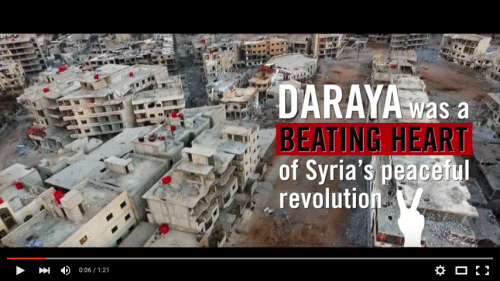One thousand, two hundred and eighty five. That’s how many days the regime of Bashar al-Assad has denied the UN access to deliver food and medicine to starving people in the besieged town of Daraya. Some have been forced to eat grass to survive.[1]
Please take 90 seconds to watch drone footage of the town to understand why breaking the siege there – and across Syria – really matters:
The brave women of Daraya asked for our solidarity with their demands and we responded.[2] Our collective pressure is starting to pay off: Daraya is climbing up the news agenda and we know that at a key international meeting in Geneva last week, the idea of airdropping aid to the town was raised for the first time – something we’ve been pushing for in thousands of messages to decision-makers and media work.[3]
We also saw the first UN vehicles enter Daraya in over three years. Astonishingly this wasn’t to deliver aid, but just to have a look around and make an assessment.[4] The UN would defend these empty cars by arguing that if they had taken any aid on that convoy, the regime of Bashar al-Assad wouldn’t have let them in.
Which is precisely the problem.
We’re letting the leading perpetrator of the killing in Syria deny the world’s aid to the most vulnerable. Bashar al-Assad’s regime is responsible for a staggering 95% of civilian deaths in Syria and he is being allowed to dictate where this life-saving food and medicine goes.[5]
It shouldn’t be happening.
This international aid that has been generously donated by people around the world must be delivered to those in most need. If the trucks can’t go in we must look for others ways – and we have them.
Airdrops are a proven method of last resort that humanitarians can use once all other routes have been exhausted. After more than a thousand days of blocked aid to Daraya nobody can credibly claim that we haven’t reached that point.
Many of the key governments arguing for aid access to Daraya are already flying in Syrian airspace. The US, UK, France, Germany and the Netherlands are but a few.
These countries are ready to drop bombs, but none so far are prepared to drop bread.
To these governments we must say loud and clear: you have the power to get food and medicine to the starving people of Daraya and other besieged areas in Syria. No more finger pointing, no more blaming others, no more excuses:
https://act.thesyriacampaign.org/sign/airdrop-aid-syria-now/
In solidarity,
James
NOTES
[1] Reuters: UN says Syrians eating grass in government-besieged Daraya http://www.reuters.com/article/us-mideast-crisis-syria-daraya-idUSKCN0WK1V2
[2] Daraya Women: We are on the verge of witnessing deaths from starvation https://diary.thesyriacampaign.org/an-urgent-call-from-the-women-of-the-besieged-town-of-daraya/
[3] Airdrops to Daraya in Humanitarian Task Force meeting: http://www.un.org/sg/offthecuff/index.asp?nid=4476
[4] UN visit reported by Daraya Local Council: https://www.facebook.com/daraya.council/photos/490307034497203/
[5] Who’s Killing Civilians in Syria? http://whoiskillingciviliansinsyria.org

The Syria Campaign is building an open, global movement working for a peaceful future for Syria. We are people from all over the world who are coming together to tackle what the UN has described as “the greatest humanitarian tragedy of our time”.
Follow us on Facebook and Twitter.


![Palestinians forever changed by Israeli torture Nour Alyan, 27, who says he was held in stress positions for hours while in Israeli detention, displays the paperwork from his five separate arrests [Edmee Van Rijn/Al Jazeera]](https://i0.wp.com/www.aljazeera.com/mritems/imagecache/mbdxxlarge/mritems/Images/2016/4/2/6c4ec1fd57d14e88ae8e7add3cd9b63c_18.jpg)




